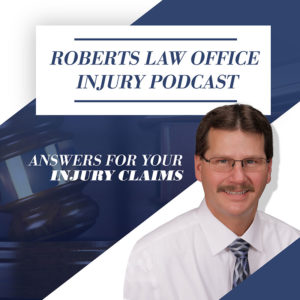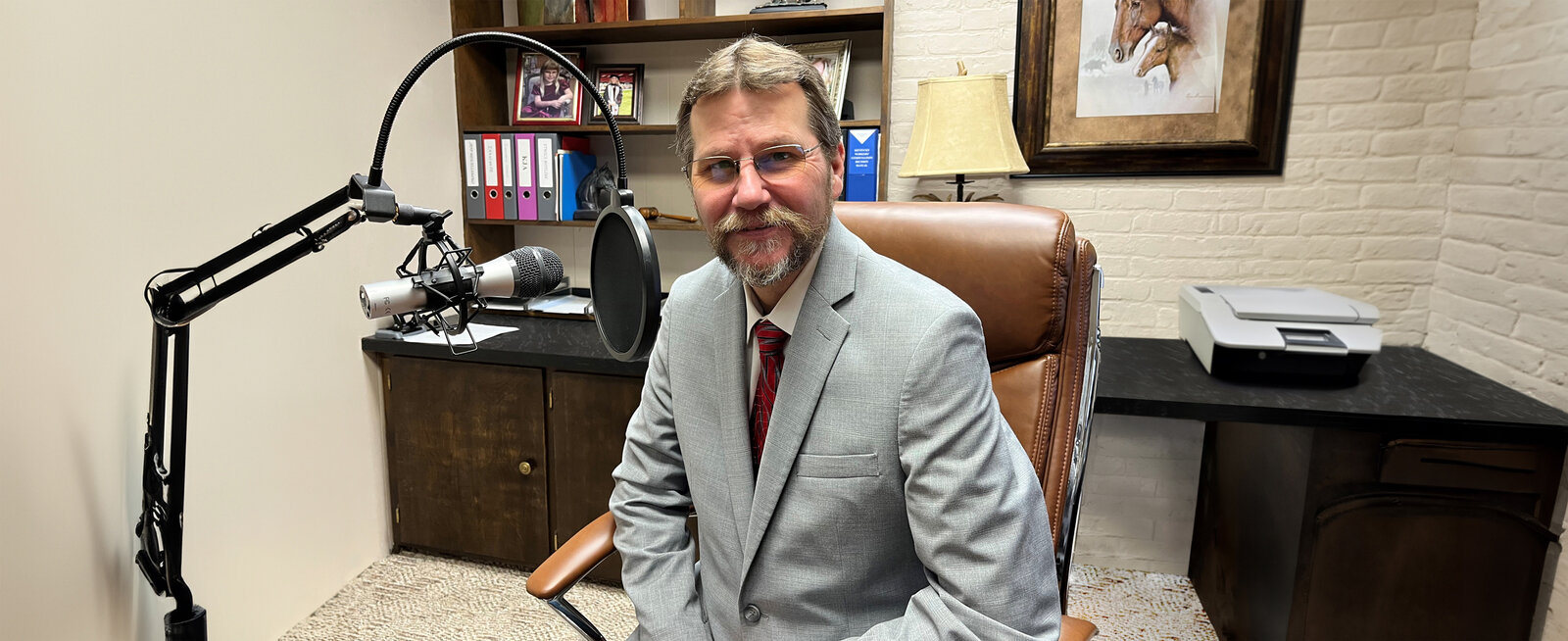Episode 69: In this episode, Jeff Roberts discusses the issue of whether you should give a recorded statement to an insurance adjuster. This situation can occur after a car wreck, motorcycle accident or even if you have a workers’ comp claim. Jeff has practiced law over 30 years and understands why they want a recorded statement and how it can potentially be used against you.
After a Motor Vehicle Accident
It’s a common tactic for an insurance adjuster, who represents the at-fault driver, to try to get you to make a recorded statement. This usually happens over the phone and when they assume you’re not sitting with your attorney. Red flags should go up in your mind.
Normally, the conversation would involve you discussing what happened, what injuries you received, any medical treatment you received and any past medical issues. They’ll actually carefully phrase the questions to benefit their client, not you.
Remember, Kentucky is a comparative fault state. They want to try to get you to admit that you were at least partially at fault for the collision, because that would limit their financial exposure. Jeff discusses pure comparative fault in Episode 58.
Jeff explains that the insurance adjuster also wants to get you to make statements in which you limit the extent of the injuries and/or pain your experiencing. This will be used later to argue you weren’t hurt as badly as your attorney is trying to say you were.
Additionally, if you fail to describe problems and/or pain, they will use that oversight to try to blame the pain on something other than the motor vehicle collision. After all, you didn’t mention it during your early discussion with them.
Don’t Do This on Your Own
If you are trying to resolve your claim without an attorney, if they try to get you to make a recorded statement, it’s time for you to speak with an attorney. You are not required to give a recorded statement to the other person’s insurance company.
In most situations, you may not realize the damage you’re doing to your claim. Adjusters are skilled negotiators and have these types of conversations all day long. They have an advantage over the average person who simply wants to resolve the situation. Understand you’re swimming with sharks, regardless of how nice they sound on the phone.
Recorded Statements Are Not Needed
Jeff explains that a recorded statement is not needed to resolve your auto accident claim. In fact, if he’s involved, he’ll ask to have the at-fault driver (represented by the insurance adjuster) make a recorded statement. That would be the only way Jeff will let his client make the recorded statement. In 31 years of focusing in personal injury law, he’s never had an adjuster follow up to schedule a time for their client to give a recorded statement to him.

A Recorded Statement Is Not a Deposition
It’s important to understand there’s a difference between giving a recorded statement and sitting in a deposition. The vast majority of the time, your recorded statement would be taken over the phone. The questions they want to ask you have been written by an attorney for specific purposes. One of the purposes might be to enable them to spin the answers enabling them to use your own statements against you.
Do I Have to Give a Recorded Statement to My Insurance Company?
Kentucky is a no-fault state. The insurance policy of the car you are in, at the time of the accident, is responsible to pay the first $10,000 (usually from medical bills), regardless of which driver is at fault. It’s often referred to as Personal Injury Protection (PIP) coverage. Jeff discusses PIP coverage at the beginning of Episode 65.
In your auto insurance policy, there is probably language obligating you to cooperate with your insurance company. Because of this, you may be required to give a recorded statement to your own insurance company.
Again, even though it’s your own insurance company, you should still consult with an experienced, auto accident attorney. There are situations in which you might want or need someone to help you. It’s important to be truthful in your answers, but again, some questions are designed to work against you, if needed. You may not fully understand the question being asked or the issues based on how you answer it.
Jeff points out that if your claim results in you and your attorney having to file a lawsuit against the other driver’s insurance, your recorded statement (to your own insurance company) will be turned over to the other side’s attorney.
Common Questions Insurance Adjusters Try to Ask
There are a few common questions or topics they’ll typically ask you to answer:
- What occurred?
- What problems to you have as a result of the wreck?
- What medical treatment you’ve had since the wreck?
- Did you have general medical issues prior to the wreck?
Regarding the last question in the above list, even if you saw a doctor 10 years ago and forgot to mention it when answering the question, they could accuse you of not being fully honest. Maybe the collision caused you to have low-back pain. The insurance adjuster might attempt to partially blame your pain on a pre-existing condition. Jeff discussed how attorneys deal with pre-existing conditions in Episode 30.
After a Work-Related Injury
Now, we’ll transition to a discussion of whether you should give a recorded statement related to a workplace injury resulting in a Kentucky workers’ compensation claim. These are handled differently.
Jeff explains that in an auto accident case, the at-fault driver’s insurance won’t pay anything until the claim is resolved completely. In workers’ comp, your medical bills are paid as they are incurred. Payment for your lost wages will be paid as they are incurred. Therefore, there’s an incentive to be cooperative in handling your claim.
If you don’t give a recorded statement in a worker’s comp claim, they could actually deny your claim. They have the right to investigate the extent of the injury, if there were pre-existing conditions and if the injury was actually work-related.
Jeff permits them to take recorded statement from his client, but he might ask to do the same for any co-workers who may have been present at the time of the injury, if needed. Jeff would want to be present and listening in on the recorded call, so he can help to get his client to clarify an answer(s).
Talk to a Workers’ Compensation Attorney
Before you give a recorded statement related to your workers’ comp claim, you should talk to an attorney. Games are often played when it comes to ways an insurance company tries to limit your benefits, even in a workers’ comp situation.
How Much Does an Attorney Cost?
Jeff explains that he handles car wreck cases, motorcycle accident cases and workers’ comp cases on a contingency fee basis. There are no up-front fees to speak with Jeff. He gets paid when the case is resolved. His attorney fees and court costs and case expenses are deducted at the end of the case. His fee is contingent upon a recovery in your case. If there’s no recovery, there’s no fee and that includes his case expenses and court costs.
Listen to a detailed discussion about contingency fees in Episode 56.
What Do They Ask About in a Workers’ Comp Recorded Statement?
It’s very similar to a personal injury claim. They’ll want to know:
- What happened?
- Where are you hurting?
- What injuries did you receive?
- What medical treatment have you received since the workplace injury?
- What types of prior medical issues have you experienced?
- Which doctors have you seen in the past several years?
Remember, they’re looking for a way to shift the blame to a non-work-related injury or a pre-existing injury. It may limit what they have to pay you in workers’ comp benefits.
Does a Jury Hear My Workers’ Compensation Case?
No. In Kentucky, workers’ compensation cases are heard by an administrative law judge. There is no jury. The judge will make factual decisions in the case and will ultimately render a decision.
Your recorded statement may be played for the judge during your hearing. Sometimes, your attorney can effectively handle what you said in your recording statement. Once the judge begins doubting your honesty, it’s difficult to regain an equal footing. Again, this is why you need to have your attorney involved if you decide, or are required, to give a recorded statement.
Is There a Benefit to Giving a Recorded Statement?
In a workers’ comp setting, there can be. Again, if you refuse, they can deny your claim and you won’t get your medical expenses paid or any benefits to cover lost wages.
On the other hand, if your injury was due to a safety violation by your employer, your statement can explain important details such as the machine was missing a safety stop and you had previously informed your supervisor or other manager. You got hurt because they failed to fix the machine you were operating at the time of your injury.
Safety violations are taken seriously in workers’ comp claims. They can increase the benefits you receive. Having your statement recorded can be very helpful to your claim. Jeff can get a copy of that recording and use it to your advantage. This is particularly helpful if the company has suddenly replaced the safety stop or guard has been replaced, after your injury. Remember, games get played.
What Do Other Clients Think About Jeff?
We always encourage listeners to read the Google Reviews Jeff Roberts has received from many of his clients. A 5-Star rating and the comments are earned recognition and demonstrate Jeff’s commitment to his clients. As a solo attorney, he has more Google Reviews than some firms with multiple attorneys. Jeff shares the credit with his staff at the Roberts Law Office. Successfully representing a victim of an automobile or motorcycle accident is a team effort. It’s why Jeff likes to say his firm offers small town service with big city results.
Jeff Roberts Represents Injured Clients Throughout Kentucky
With offices located in Calloway County and now Christian County, Jeff has a history of representing personal injury clients, workers’ compensation clients and social security disability clients across the state. He’s represented clients from Paducah, Bowling Green, Louisville, Covington, Whitesville and many other Kentucky locations. He’s not just a Western Kentucky injury attorney.
We hope you found this episode insightful and helpful. Thank you for listening!
Is It Time to Speak with an Attorney about your Workers’ Compensation Claim?
The office phone number is (270) 753-0053 or toll free at 800-844-5108. For more information, visit www.JeffRobertsLaw.com. This podcast is meant to provide information and is not legal advice. Jeff’s principal office is located at 509 Main Street, Murray, Kentucky. Co-host Jim Ray is a non-attorney spokesperson. This is an advertisement.




